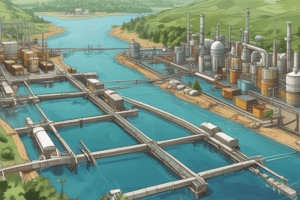Podcast
Questions and Answers
What is the potential harmful effect of acids and alkalis in industrial wastewater?
What is the potential harmful effect of acids and alkalis in industrial wastewater?
- Promoting the growth of aquatic life
- Increasing oxygen level in water bodies
- Causing harm to human health
- Causing corrosion to water pipelines (correct)
How do biodegradable organics affect water bodies?
How do biodegradable organics affect water bodies?
- Prevent sunlight from reaching water bodies
- Reduce oxygen level and threaten aquatic life (correct)
- Increase oxygen level and promote aquatic life
- Cause brain diseases in aquatic organisms
What is the effect of suspended solids on water bodies?
What is the effect of suspended solids on water bodies?
- Increase oxygen level and benefit aquatic life
- Cause corrosion to water pipelines
- Promote the growth of bacteria in water bodies
- Prevent sunlight from reaching water bodies (correct)
What is a characteristic of heavy metals like mercury in wastewater pollutants?
What is a characteristic of heavy metals like mercury in wastewater pollutants?
How is elemental mercury converted in the water?
How is elemental mercury converted in the water?
Flashcards are hidden until you start studying
Study Notes
Water Pollution
- Water pollution affects our daily life in various ways, including industrial use, agricultural use, domestic use, and treatment.
Water Resources
- Surface water resources include:
- River Nile (branches and canals)
- Saline water (lakes, seas, including Red Sea and Mediterranean Sea, and Suez Canal)
- Underground water is the most important source for our future.
Industrial Wastewater Pollutants
- Types of pollutants include:
- Acids
- Alkalis
- Biodegradable organics
- Suspended solids
- Dissolved solids (salts)
- Nutrients (N2, P)
- Refractory organic (non-biodegradable) compounds, such as:
- Phenol
- Pesticides
- Aromatics
- Oil and grease
- Pathogens
- Heavy metals, including:
- Copper (Cu)
- Cadmium (Cd)
- Nickel (Ni)
- Lead (Pb)
- Mercury (Hg)
Key Terms
- T.D.S (Total Dissolved Solids)
- pH (measure of acidity/basicity)
- T.S.S (Total Suspended Solids)
- BOD (Biochemical Oxygen Demand)
- COD (Chemical Oxygen Demand)
Waste Management Steps
- (Note: Steps not specified in the provided text)
Waste Treatment Steps
- (Note: Steps not specified in the provided text)
Studying That Suits You
Use AI to generate personalized quizzes and flashcards to suit your learning preferences.



